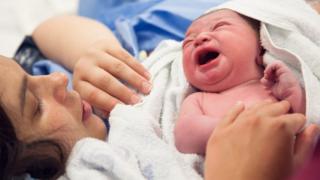Breech baby scan ‘would save lives’
 Image copyright Getty Images
Image copyright Getty Images Mums-to-be could be routinely offered an ultrasound scan at 36 weeks to help spot risky breech deliveries, when a baby’s bottom or feet will emerge first, say UK researchers.
Breech births can be hazardous and tricky to diagnose.
Currently, midwives and doctors tend to rely on the shape and feel of the mother’s bump to check.
Researchers estimate the scans would avoid 4,000 emergency caesareans and eight baby deaths a year in England.
If the scans could be done cheaply enough then it should also save the NHS money in terms of care, says the University of Cambridge team in the journal PLoS Medicine.
About three to four babies in every 100 are in a breech position near the end of pregnancy.
More babies start out breech but will turn to the ideal “head-first” position by about 36 weeks’ gestation.
The researchers offered breech scans to 3,879 pregnant women:
- 179 (4.6%) were found to be breech
- In more than half of these cases (96 of the pregnancies or 55%) there had been no suspicion until the scan result
Making the diagnosis at 36 weeks meant the women could be offered an attempt at manually encouraging the baby to turn in the womb to the head-first position before labour – a manipulation method called external cephalic version.
For the women who declined, or where it did not work, a planned caesarean section was arranged. None of the women opted to attempt a vaginal breech birth, which is possible but carries some risk.
Nineteen of the 179 women were able to deliver vaginally, 110 had a planned caesarean and 50 needed an emergency caesarean.
Implications
Researcher Prof Gordon Smith said it should be feasible to provide the service at a low cost, for example by making it a part of a standard midwife appointment and using inexpensive portable ultrasound machines.
“If it was under £20 per patient then it would be cost-effective and if it could be done for under £13 then it should save the NHS money in the long run,” he said.
Experts said the cost-effectiveness for the NHS should be explored.
Private patients can pay from £30 to £200 or more for a pregnancy ultrasound scan.
Prof Andrew Shennan, professor of obstetrics at King’s College London, said the scans should be rolled out.
“Breech can be difficult to manage in labour if previously unsuspected, as labour can be quick,” he said.
“Breech deliveries have some risk, and counselling and decision-making in labour can be challenging. Scans are routinely available now, and minimal skills are required to determine breech presentation. This should be implemented.”
But Prof Jean Golding, emeritus professor of paediatric and perinatal epidemiology at the University of Bristol, disagrees. She said bigger, randomised trials were needed first.
Prof Basky Thilaganathan, from the Royal College of Obstetricians and Gynaecologists, said more research was needed, but added: “So far, the evidence for its use looks very promising.”







